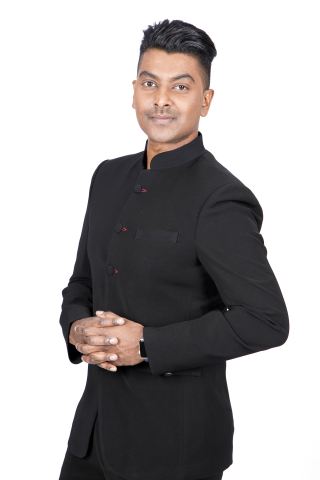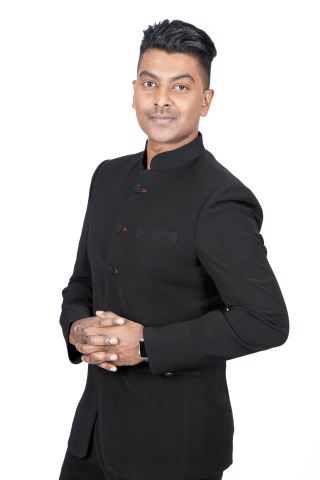Curios and Handicrafts Not the Way to Equality in Africa
By Devan Moonsamy, CEO of The ICHAF Training Institute
In an interview earlier this year, Jessica Horn, director of programmes at the African Women’s Development Fund (AWDF) voiced concern about the type of work African women are involved in, or, rather, the type of work that is thought to be suitable for them and into which they are often drawn due to low education levels.
Jessica Horn said that economic empowerment initiatives too often teach women to make handicrafts such as cheap beaded jewellery. The same may be said for men who make wooden carvings which they try to sell on the roadside. These women and men tend to make low-priced goods and work for relatively low pay. They often also rely on seasonal work, only making sufficient income when enough tourists are around. They are thus stuck in informal and unprotected employment, or in the so-called ‘gig economy’.
The market is flooded with African curios and artworks made by the nameless or, sometimes, they may even be sold for high prices under someone else’s name. Of course, the real creators aren’t credited for their creations, and a fair income doesn’t find its way to the creators either. If artworks don’t sell, it is also the creators who end up taking the blame, and sometimes they are forced to pay for this, and even to dismantle their unappreciated artworks. This problem echoes colonial exploitation and disparities in power.
As an example, one South African has other artists paint for them and then their signature is stamped on each painting. The real artist remains nameless. In other cases, it may be, for example, rural women who are taught to bake cookies or recycle materials into artworks for sale in the cities. On the surface, there is nothing wrong with this. Teaching baking and craft-making can mean some income for a person who had no chance at education and very few employment prospects.
However, as Jessica Horn emphasises, worthwhile projects must lead to increased income generation and greater political participation. They must have large-scale potential, and they must lead to women having significant economic and political power, enabling them to advocate for their political rights and engage on various platforms. Women must be able to grow their income over time, not remaining stagnant and stuck on low-wage work which benefits others more than it does themselves.
Kabelo Malatsie, director of Visual Arts Network of South Africa, fights for artists’ rights and is working to end the exploitation of struggling artists. She says that exploitation is rife and, in the fine art world, that there may be a mere 15 ‘good’ galleries in the whole country.
Among the concerns of activists like Horn and Malatsie are that artists need to be creative, working very hard to be original, have good administrative skills, and time to dedicate to both, as well as a support structure, and funding to get their artworks in the public eye. They also need to be adept in the use of social media, have good interpersonal skills, networks and confidence. Many artists can’t manage all this, they lose hope, and end up leaving the industry altogether, especially if they are tired of being invisible. Partners, commissioners, and employers of artists who do have certain other skills and funding end up taking all the credit for the artists’ work.
Jessica Horn of AWDF thus wants to change the traditional development model which is intended to promote women’s equality and empowerment. She explains: ‘Nobody likes being oppressed, but sometimes resisting carries too much loss, stigma, so a lot of people fear that.’ On the other hand, those who need to be resisted are more confident and have no qualms about using others. She thus concludes that ‘it’s about being able to meet that attitude.’ This requires completely different skills to those traditionally taught to women. Rather than teaching handicrafts (alone), women need confidence-building, administrative and business skills, entrepreneurial skills, job skills to help secure employment, and social media, communication and technology use skills. Training may need to begin with literacy and numeracy in some cases as well.
Devan Moonsamy is the author of Racism, Classism, Sexism, And The Other ISMs That Divide Us, available from the ICHAF Training Institute.
The book tackles contemporary issues in the South African workplace, including a variety of diversity-related challenges and how these can be overcome. It is an excellent guide for managers to harnessing diversity for success.
ICHAF offers SETA-approved training in business skills, computer use, and soft skills. Devan specialises in conflict and diversity management, and regularly conducts seminars on these issues for corporates. To book a seminar with Devan or for other training courses, please use the contact details below.
Tel: 011 262 2461 | Email: This email address is being protected from spambots. You need JavaScript enabled to view it. | Website: ichaftraining.co.za
Migrant Workers Exploited in SA Fast-Food Restaurants
Devan Moonsamy CEO of The ICHAF Training Institute Immigration is usually not about wanting to travel, but a dire necessity when conditions in one’s own country are so unstable and hazardous that the only other option is to become a second-class, unwelcome, even illegal resident in another country. If it is safer to do this, think how bad it must be back home for migrant people coming into South Africa.
It has come to light that certain fast-food restaurants based in South Africa are taking advantage of that desperation. The working week is usually about 40 hours, including lunch breaks. Employees at certain fast-food restaurants are working an exhausting 80-hour week, some as high as 87 hours a week. Seven days a week they work double shifts, not being relieved from duty at any time while the restaurant is open from morning to evening.
They also receive no help whatsoever with transport. Leaving work after 10:00 at night, they may get home close to midnight, after taking more than one taxi. Considering that the majority of these chain restaurant workers are women, this is hardly safe. What opportunity do they have to spend time with their families, to get enough sleep?
And the pay? A meagre R18 an hour; no tips allowed. Migrant workers in other industries are receiving even less at R10 an hour. The average salary in Johannesburg is about R33 000 per month, for Cape Town it is almost R29 000, and in Durban and Bloemfontein it is about R23 000. This means that the average hourly rate is about R140 to R200. While migrant workers at fast-food outlets may earn a salary, and many unemployed people would be grateful for that, the labour conditions are exploitative and certainly do not justify the salary, especially one so much lower than the average.
In some restaurants, employees are even expected to pay for branded uniforms, and even special safety shoes which cost about R300 and more, costing workers at least 16 hours of their wages. Wages are also deducted if the employee is late, regardless of the reason.
Some of the workers are living in SA illegally, but rather than seeing it as a problem to be addressed, the franchises see it as an opportunity for exploitation. Furthermore, by accepting employees with no visa, they encourage the influx of illegal migrants.
Among the most serious forms of worker abuse in these restaurants is discrimination against women who fall pregnant. Because the workers are viewed as disposable, pregnant women are simply laid off. Labour laws are not implemented to protect immigrants, especially women who lose support for their visas when they fall pregnant.
Some women who are pregnant are refused assistance by their employer, even to renew an asylum status visa. They are forced to go back with a baby to care for and little prospect of making a living. This also splits families up.
The treatment of these workers calls for a boycott of the guilty companies. However, this may make the situation worse because workers may be granted shorter hours but the hourly rate remain unchanged, resulting in a loss of income. Some may also be laid off.
Where do we turn for answers to these problems? Franchises and restaurants aren’t all bad, and there are lessons to be learnt from some of them. Nandos has been identified as among those with better labour practices. Apparently, they make use of a careful screening process in recruitment, and representatives from the headquarters regularly hold meetings with franchises about the working conditions of employees and their salaries.
It is also said that some franchises send undercover workers to monitor what is really happening. Such practices must be implemented in more fast-food franchises to protect migrant people in South Africa.
Devan Moonsamy is author of Racism, Classism, Sexism, And The Other ISMs That Divide Us, available from the ICHAF Training Institute.
The book tackles contemporary issues in the South African workplace, including xenophobia and issues related to migrant workers. It is an excellent guide for managers to harnessing diversity for success and overcoming diversity-related challenges.
Devan specialises in conflict and diversity management, and regularly conducts seminars on these issues for corporates. To book a seminar with Devan, please use the contact details below.
Tel: 011 262 2461 | Email: This email address is being protected from spambots. You need JavaScript enabled to view it. | Website: ichaftraining.co.za
Muslim women’s rights rulings: Are we still in denial?
By Devan Moonsamy – CEO The ICHAF Training Institute
About a week ago, the Western Cape High Court made a ruling which provides legal protection to Muslim women and their children in cases of divorce. The Weekend Argus reported, ‘The Western Cape High Court judgment ordering Muslim marriages to be legally recognised speaks directly to “a very patriarchal Muslim society”, which has always benefited men and left women with nothing after divorce.’ The Muslim Judicial Council welcomed the decision, which it seems should have been made long ago.
It is not the only recent legal development which has sought to protect women’s rights in Muslim marriages. Why should there even be a need for this? South Africa is supposed to be among the nations with the best legislation worldwide. Isn’t this already in place? Surely when we got our full Constitution in 1996 it cleared all this away?
No, it didn’t. It hasn’t solved all our problems. The High Court and the Constitutional Court still have a lot of work to do in protecting people by ensuring the correct interpretation and implementation of our laws.
This is a strong case in point when it comes to women’s rights denialists who continue to stare blank-faced at the plight of women (and other victims of discrimination too). By this I mean that some people assume women have equal rights in law – they definitely do not in all cases – and this has fixed everything. But even where everyone has equal rights in law, in practice true justice is sorely lacking.
Why do genuine victims of discrimination still get no recognition? Some women are still cast aside when their husband dies. Our laws and rulings like these are not an excuse to sit back on our laurels and turn away from the plight of others. Black people still suffer in this country because of their colour. Women still suffer because of their gender. Children, youths and the elderly still suffer because of their age.
We have to stop denying these facts. I feel so frustrated sometimes when I hear people say things like, ‘But women/black people/youths have been given everything they want.’ The real attitude behind such statements is that they have ‘lost out’ because of this. ‘We’ve given you what you want – equal rights, jobs, education, etc. – what more must we do for you?’ They think it’s because people who are facing serious challenges are just ungrateful.
Do we really think that people in subordinate positions are complaining because they have nothing better to do? If this is true, why do we still need court rulings to protect women after the death of their husband? Despite such developments, women’s struggle against patriarchal dominance continues.
We have to start seeing the truth behind excuses that people have ‘equal rights’, that the women’s liberation movement has already achieved its ends, that racism and sexism outlawed has brought a closure to the matter.
We need to keep our eyes and hearts open to the plight of anyone and be willing to see and empathise with their pain. If we don’t, injustice of all kinds will continue to eat away at our lives because ‘None of us are free until all of us are free.’
-- ENDS --
Tel: 011 262 2461 | Email: This email address is being protected from spambots. You need JavaScript enabled to view it. | Website: www.devan-moonsamy.com www.ichaftraining.co.za




